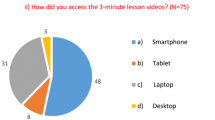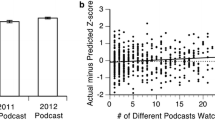Abstract
Providing students with supplementary course materials such as audio podcasts, enhanced podcasts, video podcasts and other forms of lecture-capture video files after a lecture is now a common occurrence in many post-secondary courses. We used an online questionnaire to ask students how helpful enhanced podcasts were for a variety of course activities and how important having access to the enhanced podcasts was in their decision to miss classes. Student responses from two courses, one introductory and one advanced, were compared. Students in the introductory Genetics course reported that having access to enhanced podcasts was “very important” in their decision to miss class more often (39%) than those in the advanced Microbiology course (20%). They also reported missing more classes than students in the advanced course. Students in both courses found the enhanced podcasts helpful for a range of learning activities. First year students who missed just a few classes and those who missed many classes both found the enhanced podcasts to be very helpful for learning activities. We argue that creating these resources is a good choice for instructors irrespective of the level of the course they teach and that the potential value of these resources, particularly for first year students, outweighs any impact that having access to supplementary enhanced podcasts of the lectures may have on class attendance.


Similar content being viewed by others
References
Bassili JN (2008) Media richness and social norms in the choice to attend lectures or to watch them online. J Educ Multimed Hypermedia 17(4):453–475
Billings-Gagliardi S, Mazor KM (2007) Student decisions about lecture attendance: do electronic course materials matter? Acad Med 82(10):S73–S76
Blaisdell M (2006) Academic MP3 s—is it iTime yet? Campus Technology, 2/28/2006. http://www.campustechnology.com/article.aspx?aid=40744. Accessed 20 Oct 2008
Bongey SB, Cizadlo G, Kalnbach L (2006) Explorations in course-casting: podcasts in higher education. Campus Wide Info Syst 23(5):350–367. doi:10.1108/10650740610714107
Brittain S, Glowacki P, Van Ittersum J, Johnson L (2006) Podcasting lectures. EDUCAUSE Q 29(3):24–31
Brunsden V, Davies M, Shevlin M, Bracken M (2000) Why do HE students drop out? A test of tinto’s model’. J Further High Educ 24(3):301–310. doi:10.1080/030987700750022244
Campbell G (2005) There’s something in the air: podcasting in education. EDUCAUSE Rev 40(6):32–46
Cardall S, Krupat E, Ulrich M (2008) Live lecture versus video-recorded lecture: are students voting with their feet? Acad Med 83(12):1174
Chen J, Lin TF (2008) Class attendance and exam performance: a randomized experiment. J Econ Educ 39(3):213–227
Chickering AW, Gamson ZF (1999) Development and adaptations of the seven principles for good practice in undergraduate education. New Dir Teach Learn 80:75–81. doi:10.1002/tl.8006
Cook C, Heath F, Thompson RL (2000) Meta-analysis of response rates in web- or internet-based surveys. Educ Psychol Meas 60:821–836. doi:10.1177/00131640021970934
Copley J (2007) Audio and video podcasts of lectures for campus-based students: production and evaluation of student use. Innov Educ Teach Int 44(4):387–399. doi:10.1080/14703290701602805
Cramer D (1994) Introducing statistics for social research: step-by-step calculations and computer techniques using SPSS. Routledge, London
Deal A (2007) A teaching with technology white paper: podcasting (ID: CSD5003). Educause CONNECT, http://connect.educause.edu/files/CMU_Podcasting_Jun07.pdf. Accessed 8 Oct 2008
Dollinger SJ, Matyja AM, Huber JL (2008) Which factors best account for academic success: those which college students can control or those they cannot? J Res Pers 42(4):872–885. doi:10.1016/j.jrp.2007.11.007
Evans C (2008) The effectiveness of m-learning in the form of podcast revision lectures in higher education. Comput Educ 50(2):491–498. doi:10.1016/j.compedu.2007.09.016
Fernandez V, Simo P, Sallan JM (2009) Podcasting: a new technological tool to facilitate good practice in higher education. Comput Educ 53(2):385–392
Friedman P, Rodriguez F, McComb J (2001) Why students do and do not attend classes: myths and realities. Coll Teach 49(4):124–133
Grabe M, Christopherson K (2008) Optional student use of online lecture resources: resource preferences, performance and lecture attendance. J Comput Assist Learn 24(1):1–10. doi:10.1111/j.1365-2729.2007.00228.x
Guertin LA, Bodek M (2007) Questioning the student preparation, use of and desire for geoscience podcasts. Conference Proceedings of the Annual Meeting of the Geological Society of America, Denver, Colorado, USA, 28–31
Gump SE (2006) Guess who’s (not) coming to class: student attitudes as indicators of attendance. Educ Stud 32(1):39–46. doi:10.1080/03055690500415936
Harrison DA, Shaffer MA (1994) Comparative examinations of self-reports and perceived absenteeism norms— wading through lake-wobegon. J Appl Psychol 79(2):240–251
Hew KF (2009) Use of audio podcast in K-12 and higher education: a review of research topics and methodologies. Educ Tech Res Dev 57(3):333–357. doi:10.1007/s11423-008-9108-3
Holbrook J, Dupont C (2009) Profcasts and class attendance—does year in program matter? Bioscience Education, 13. http://www.bioscience.heacademy.ac.uk/journal/vol13/beej-13-c2.pdf. Accessed 12 Nov 2009
Hurtado S, Sax L, Saenz V, Harper C, Oseguera L, Curley J, Lopez L, Wolf D, Arellano L (2007) Findings from the 2005 administration of your first college year (YFCY): National aggregates. http://www.heri.ucla.edu/PDFs/2005_YFCY_REPORT_FINAL.pdf . Accessed 12 Nov 2009
Jensen M (2007) Lecture is dead: take 3. Am Biol Teach 69(3):138–139
Jham BC, Duraes GV, Strassler HE, Sensi LG (2008) Joining the podcast revolution. J Dent Educ 72(3):278–281
Laing C, Wootton A, Irons A (Eds.). (2006) iPod! uLearn? In current developments in technology-assisted education, vol. I: general issues, pedagogical issues, pp 514–518, Badajoz, Spain. www.formatex.org/micte2006/pdf/514-518.pdf. Accessed 6 Nov 2008
Lane C (2006) Podcasting at the UW: an evaluation of current use. Catalyst. http://www.washington.edu/lst/research_development/papers/2006/podcasting_report.pdf/view . Accessed 8 Oct 2008
Lonn S, Teasley SD (2009) Podcasting in higher education: what are the implications for teaching and learning? Internet High Educ 12(2):88–92. doi:10.1016/j.iheduc.2009.06.002
McGarr O (2009) A review of podcasting in higher education: its influence on the traditional lecture. Australas J Educ Technol 25(3):309–321
McKinney D, Dyck J, Luber E (2009) iTunes University and the classroom: can podcasts replace professors? Comput Educ 52(3):617–623
Moore R, Jensen M, Hatch J, Duranczyk I, Staats S, Koch L (2003) Showing up: the importance of class attendance for academic success in introductory science courses. Am Biol Teach 65(5):325–329
Nagel D (2008) Lecture capture: no longer optional? Campus Technology. http://campustechnology.com/articles/2008/09/lecture-capture-no-longer-optional.aspx. Accessed 13 Mar 2009
Nast A, Schafer-Hesterberg G, Zielke H, Sterry W, Rzany B (2009) Online lectures for students in dermatology: a replacement for traditional teaching or a valuable addition? J Eur Acad Dermatol Venereol 23(9):1039–1043. doi:10.1016/j.jrp.2007.11.007
Nworie J, Haughton N (2008) Good intentions and unanticipated effects: the unintended consequences of the application of technology in teaching and learning environments. TechTrends 52(5):52–58
Read B (2005) Duke U. Assesses iPod experiment and finds it worked—in some courses. The Chronicle of Higher Education, 51, 43. http://chronicle.com/article/Duke-U-Assesses-iPod/27063. Accessed 6 Nov 2008
Rhodes C, Nevill A (2004) Academic and social integration in higher education: a survey of satisfaction and dissatisfaction within a first-year education studies cohort at a new university. J Further High Educ 28(2):179–193. doi:10.1080/0309877042000206741
Saeed N, Yang Y, Sinnappan S (2009) Emerging web technologies in higher education: a case of incorporating blogs, podcasts and social bookmarks in a web programming course based on students’ learning styles and technology preferences. Educ Technol Soc 12(4):98–109
Traphagan T, Kucsera JV, Kishi K (2010) Impact of class lecture webcasting on attendance and learning. Educ Tech Res Dev 58(1):19–37. doi:10.1007/s11423-009-9128-7
Veeramani R, Bradley S (2008) Insights regarding undergraduate preference for lecture capture. University of Wisconsin-Madison Online-Learning Study.: University of Wisconsin-Madison E-Business http://www.Uwebi.org/news/uw-Online-Learning.Pdf. Accessed 6 Mar 2009
von Konsky BR, Ivins J, Gribble SJ (2009) Lecture attendance and web based lecture technologies: a comparison of student perceptions and usage patterns. Australas J Educ Technol 25(4):581–595
Acknowledgments
We would like to thank the students in these two courses who took the time to respond to the questionnaire that provided the data that this work is based on, and for support from the Centre for Teaching Excellence at the University of Waterloo.
Author information
Authors and Affiliations
Corresponding author
Appendix
Appendix
Instructions for Questionnaire: Please fill out this voluntary, anonymous survey to help us meet the needs of future classes. Your feedback is important to us and will help us make decisions about the material presented in the future. This survey should take about 5 min of your time. You will only be able to fill out the survey once.

Rights and permissions
About this article
Cite this article
Holbrook, J., Dupont, C. Making the Decision to Provide Enhanced Podcasts to Post-Secondary Science Students. J Sci Educ Technol 20, 233–245 (2011). https://doi.org/10.1007/s10956-010-9248-1
Published:
Issue Date:
DOI: https://doi.org/10.1007/s10956-010-9248-1




